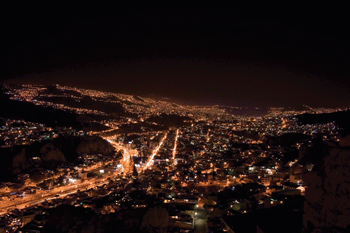Bolivia Natural Gas Rebounding?
Posted on Feb. 12, 2008 - EnergyTribune.com
By Randy Woods
 (right) La Paz, Bolivia - Photo: iStockphoto
(right) La Paz, Bolivia - Photo: iStockphoto
Bolivia's natural gas industry appears to be on the rebound. Following the industry's nationalization by President Evo Morales on May 1, 2006, concern about the business environment kept many companies away from La Paz. But over the past few months several companies have announced significant discoveries in Bolivian gas fields, and Brazil's Petrobras, the country's largest foreign investor, has agreed to ramp up its capital spending. The news should help Bolivia's industry get back on track, although the gas-rich country will continue to miss export agreements in coming years. Furthermore, the ongoing separatist movement in eastern Bolivia continues to raise questions about whether Morales is capable of ensuring the country's stability.
The commitment from Petrobras to invest as much as $1 billion in Bolivia over the next five years was a major turning point for Bolivia's natural gas industry, as companies missed a series of deadlines in 2007 to finalize new investment deals with the government. In fact, in May 2006 Petrobras was the first to speak publicly about the nationalization, arguing the move could force it to stop expanding natural gas production in Bolivia. But since then, Brazil has signed a long-term supply deal to import about 1.06 billion cubic feet per day from Bolivia. In addition, the Morales administration has intensely lobbied Brazil, promising the regulatory stability needed to perform exploration and production over the long term.
It remains to be seen whether other companies will follow the lead of Petrobras. However, a number of high-profile discoveries could tempt investors to commit to Bolivia by the April 25 deadline for submitting investment plans to the government. In early December, Morales announced that majors Repsol YPF and BG had discovered natural gas in the Caipipendi block's Huacaya-X1 field, which could produce at a rate of 28.3 million cubic feet per day. Since then, Bolivia's government has announced a discovery in the San Isidro sector of the Tacobo field by Argentine oil and gas company Pluspetrol that could produce 42.4 MMcf/d. And in addition to Bolivia's attractive geology, which boasts South America's second-largest reserves, Morales has offset the government's increased take of natural gas production by charging Brazil and Argentina higher prices for gas, according to Carlos Alberto Lopez, Bolivia's former deputy energy minister, in a presentation in Santiago, Chile last October. While nationalization initially made investors wary, the Morales administration is working hard to assure companies that the regulatory framework is stable and the rules will remain the same.